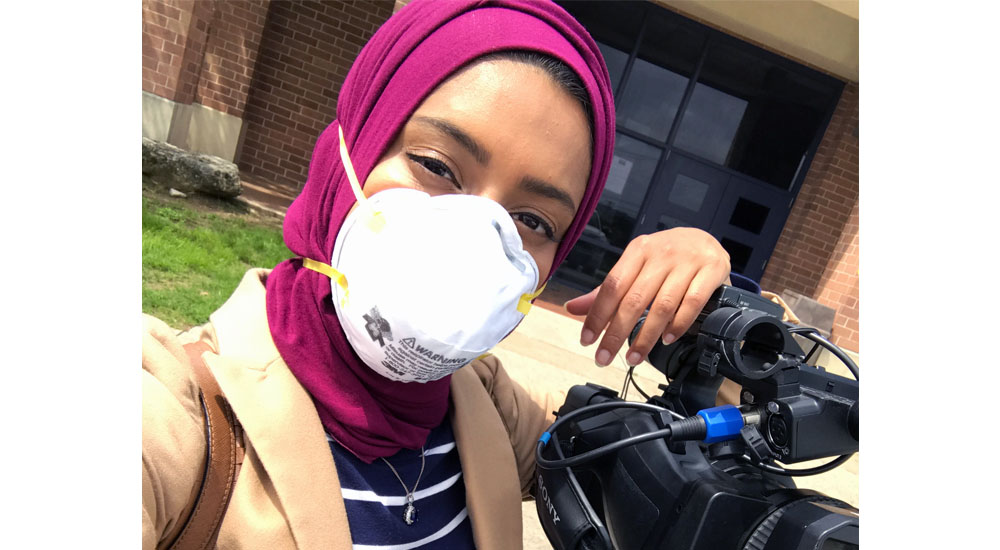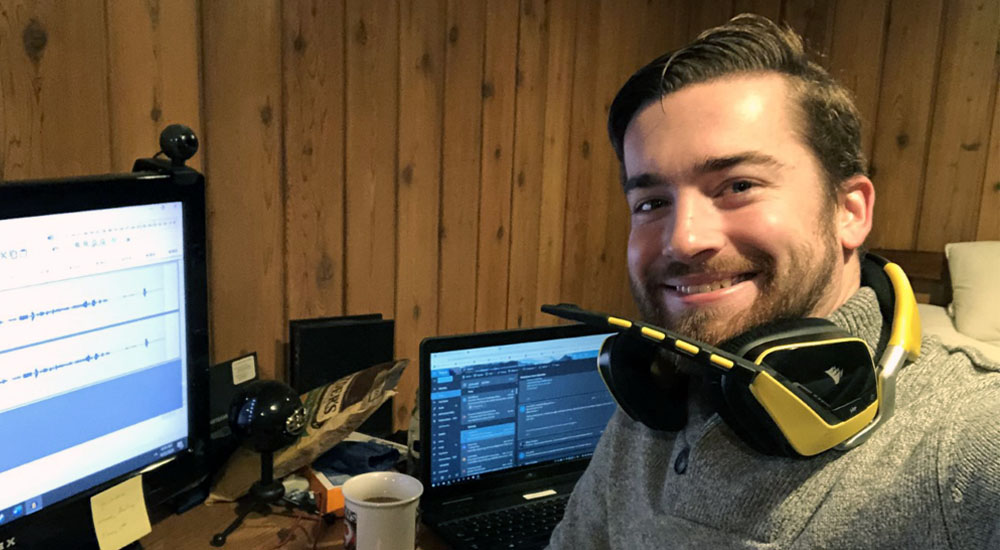On the Front Lines

Tahera Rahman, a 2013 graduate, reports on the coronavirus from Austin, Texas.
| May 6, 2020 |
|---|
Tahera Rahman, Nick Amatangelo and Mason Dowling learned how to be reporters while attending the School of Communication at Loyola. They polished their craft while working on SOC journalism activities such as the Phoenix student newspaper, Mosaic magazine, Rambler Sports Locker and Loyola News Chicago weekly TV newscast. Now they are on the front lines covering the coronavirus outbreak. Here are their stories, in their words.
Tahera Rahman
News Reporter, KXAN, Austin, Texas
BA, Journalism, International Studies, 2013
I think most reporters will agree that covering stories during a pandemic has been something else, entirely. Our operations have shifted to being mostly remote. In that sense, I think I was well-prepared, since I am a bureau reporter and mainly worked from the field pre-COVID-19.
The challenge has been for us to come up with creative ways to keep our stories engaging, despite our interviews being virtual. Can we shoot our phones off our cameras and switch up the backgrounds? Can we use transitions/effects/editing to our advantage?
The results have been pretty beautiful, and I have been consistently impressed by what my colleagues come up with. For example, we'll ask our virtual interviewees to turn their cameras around and show us what they're doing, or what their space looks like. Or, we'll ask them to take videos for us inside their restaurants. We'll also use our closets as audio booths to track our pieces.
We have become truly mobile journalists and although it is difficult, we have learned a lot about writing, editing and time management.
We have become truly mobile journalists and although it is difficult, we have learned a lot about writing, editing and time management.
Nick Amatangelo
Multimedia Journalist, KETV, Omaha, Nebraska
BA, Journalism, History, 2014
 Nick Amatangelo, 2014, covers the COVID-19 story in Omaha, Nebraska.
Nick Amatangelo, 2014, covers the COVID-19 story in Omaha, Nebraska.It’s hard to believe it’s been less than two months since COVID-19 became the leading story of every newscast, the headline of every paper and the subject of almost every conversation. But for us at KETV in Omaha, we’ve been reporting on the ongoing crisis much longer.
Our proximity to Nebraska Medicine’s Biocontainment Unit has resulted in our newsroom telling stories since early February. Seventy Americans were brought here to quarantine the first week of February and passengers from the Diamond Princess cruise ship who tested positive were brought here a few weeks later. While I was involved in telling these stories, there were others to be told and life, for the most part, continued as normal.
Then everything changed on Friday, March 6. The first patient with COVID-19 in Omaha was transferred to the Biocontainment unit from an area hospital. They had been in London and after returning, while not showing symptoms, participated in a Special Olympics event at an area YMCA.
For me, there have been a lot of long, hard days since then. I was part of the team coverage of that first patient’s arrival at the biocontainment unit. I spoke to students who had to play their state basketball tournament without fans in attendance – the Nebraska state basketball tournament was one of the only sporting events in the country that wasn’t cancelled. I spoke to a truck driver who was preparing to drive to New York City. I reported on one school district after another announcing they wouldn’t be back from spring break.
But there have also been some amazing and uplifting stories I’ve been able to cover. From businesses finding ways to adapt to survive, to donations of masks, food and handwashing stations, to a bar in rural Iowa starting a Meals on Wheels program to make sure seniors get the food they need. For every heartbreak, it seems there’s two or more stories that are heartwarming.
I’m lucky to be part of the amazing team we have at KETV. It’s inspiring to watch our team at work and to see how we’re able to roll with the punches, adapt, and still be able to put out an amazing product daily.
I’m lucky to be part of the amazing team we have at KETV. It’s inspiring to watch our team at work and to see how we’re able to roll with the punches, adapt, and still be able to put out an amazing product daily.
Our news team has been split into two teams during these times. One team is working from a remote location across the street from our building while the other team works from the station. Every week we switch.
While I know it’s the definition of ‘cliché,’ I always loved the phrase, “journalism is the first draft of history.” Part of why I like it is my background as a history major. The other part demonstrates, in my opinion, the important role journalists play.
As the coronavirus story is being written, my most recent story represents where the first draft meets the final edition. Eight historical organizations, archives and libraries in the Omaha metro area are coming together to make sure the story of the pandemic gets told. They’re looking for stories, reflections, journals, pictures, and anything else you could possibly imagine from the local community. That way when future generations look back at this moment in history, they’ll be able to see the whole story and learn from it.
I’m proud to help write that story.
Mason Dowling
Assignment Desk Manager, WAOW, Wausau, Wisconsin
BA, Journalism, 2014
 Mason Dowling, 2014, is an assignment desk editor in Wausau, Wisconsin.
Mason Dowling, 2014, is an assignment desk editor in Wausau, Wisconsin.Here at WAOW (ABC affiliate), I've taken on the role of the Assignment Desk Manager (or, depending on your verbiage of choice, Content Manager). It means I'm not out on the daily beat anymore, but it doesn't mean I'm not reporting. Often, my mornings will start going through the newsfeeds of our competitors and my own emails, brainstorming and figuring out how to advance the biggest story of our generation so far: Dealing with the fallout of COVID-19.
In my position, my reporters first have to pitch their stories to me. When it comes to different angles covering the virus, I'm grateful that I've got a diverse and insightful team of reporters who bring their ideas, perspectives and concerns to the forefront.
I do my best to keep my feelers out for stories, follow-up angles, and features, but often they'll surprise me with the stories they find and deliver on: A star from Days of Our Lives buying a local kid a pizza for his birthday; Our local businesses struggling to make ends-meet for their employees and their own expenses; High school seniors losing out on their graduating year, and the schools rallying to support them.
I'm thankful my reporters have been able to find these stories, and that I've been able to keep things solid on the home front. The pictures I've attached show my setup while I was working from home, interviewing U.S. Senator Tammy Baldwin about the PPP program. Often times, I'll take it upon myself during the day to write, edit and produce local content to fill the gaps in our reporter coverage, including stories that are a much-needed break from virus coverage.
Going through all this - the closures, the confusion, working from home - is something I and many of my colleagues have not had to do before. But, like journalists always do, we persevere and keep on digging. It's actually something of a blessing, working from home - now the people we're looking to interview have fewer excuses to not talk with us, because it's all done virtually and quickly. Many of them who aren't working in some kind of official capacity are stuck at home, and those that are at work have less than their usual workload (with some exceptions, of course).
Now, more than ever, journalists are giving a voice to those who don't get one. We highlight the mom-and-pop shop on the street corner that might have to close down after decades because they don't have the money coming in that they need to stay open.
We show the waiting lines (in-person and virtual) for unemployment checks, and the furloughs and layoff announcements every day. We see the (often partisan) battles happening in the state capitol between those who want to stimulate and re-open the economy, and those trying to listen to health experts and do what they can to flatten the curve. And in the middle of it all is us: the reporter, the writer, the editor, the producer... the ones who sift through the white noise to find the stories that matter.
It's not often we get “thank you” cards, but one I keep on my desk is from a woman who watches our show. She thanked us, in part, for not only covering essential workers, but for being essential workers. And right now, we are nothing if not essential.
